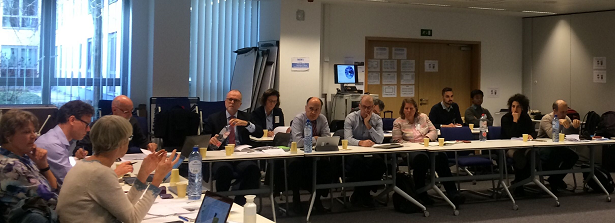European driven Food System effects on people, economies and environments in LMICs

By assessing economic, ecological and social effects of the European role in food systems in low- and middle income countries, EU interventions can be improved for better impact on the SDGs, yet this demands very new ways of multi-actor cooperation. This was concluded during the round table discussion in Brussels on October 31 with high level experts from EC DGs Agri, Research and Development and various European universities. The session, organized by SCAR (Standing Committee on Agricultural Research) working group ARCH (Agricultural Research for global CHallenges), was set up around the scoping study on the global implications of the European food system. The study was performed by a team from Wageningen University and Research (WUR) led by Petra Berkhout and Thom Achterbosch on request of ARCH, and illustrated EU’s import and export position from different angles: geographic, economic and preferred trade agreements.
Presentation of the study
The EU is a major player on the world market for agricultural products. A wider perspective, than the traditional focus on ‘economics’ of trade, is necessary to better understand the impact of EU trade in LMICs. Three major trade commodities were studied: cocoa, fish and soy. EU agricultural trade of those products seems to have negative impacts, particularly on land use, deforestation and loss of landscape value, water scarcity, farm worker welfare and curtailed agricultural development potential. Benefits, on the other hand, occur particularly in terms of export revenues, rising wage income, increased human capital, and food availability. System thinking can help understand the increasing complexity of food production by showing how drivers (various aspects of food chains), trade-offs, feedback mechanisms and SDGs are interlinked. Drawbacks to such an approach are complexity, a focus on formal systems and lots of data needed to understand how systems work. The WUR researchers suggest that new policies to shape the direction of the EU food system and to deliver on relevant SDGs (1, 2, 8, 12, 13, 14 and 15) should be informed by an understanding of the impact of trade, available choices and the potential trade-offs they imply for all system participants, i.e. farmers and fishermen, traders, the food industry and final consumers. The full presentation can be found here.
Panel reactions
In a first reaction from DG Agri it was mentioned that the EU food system might not be the main driver of negative effects on poverty and environment in LMICs; total EU impact might even be relatively positive. The EU should thus search for specific value chains where it is in the position to generate a positive impact. From the University of Hohenheim it was added that indeed the study did not look at negative effects caused by specific EU engagement in the countries, but at general ones that are probably mainly LMICs governance issues. More research with specific EU analysis is much needed from a non-political fact-based perspective, using various indicator frameworks to pick up good examples and reduce negative EU effects. Positive EU food interventions impact should be taken into account, such as results of OECD and FAO guidelines and public-private agreements for responsible agri-food business behaviour. In this regard the University of Leuven plead for the development of food systems indicators diving into changing mechanisms of stock flows, leverage points, and deep structures.
Implications and way forward
DG RTD concluded that in the EU Africa road map, research on food systems and trade with Africa have not been addressed so far. They will build on this study and discussions during the round table and have more exchanges around it to address a meaningful research agenda. Also research innovation issues that hamper competitive food systems should be looked into, even as lacking logistics and governance to reach EU markets from LMICs.
The WUR researchers underlined that national EU governments should indeed reflect on how to intervene with businesses to make production and trade more sustainable, and encourage research addressing how to jointly change food systems. The EU may serve as a platform for coordination. Using a food system approach will help working beyond a strictly economic approach, for example from a sustainable consumers’ perspective, and beyond agriculture alone. Possible trade-offs and intervention entry-points for countries and businesses will become clearer. In required new ways of partnership adapted to those insights they will be able to better contribute to achieving SDGs.





